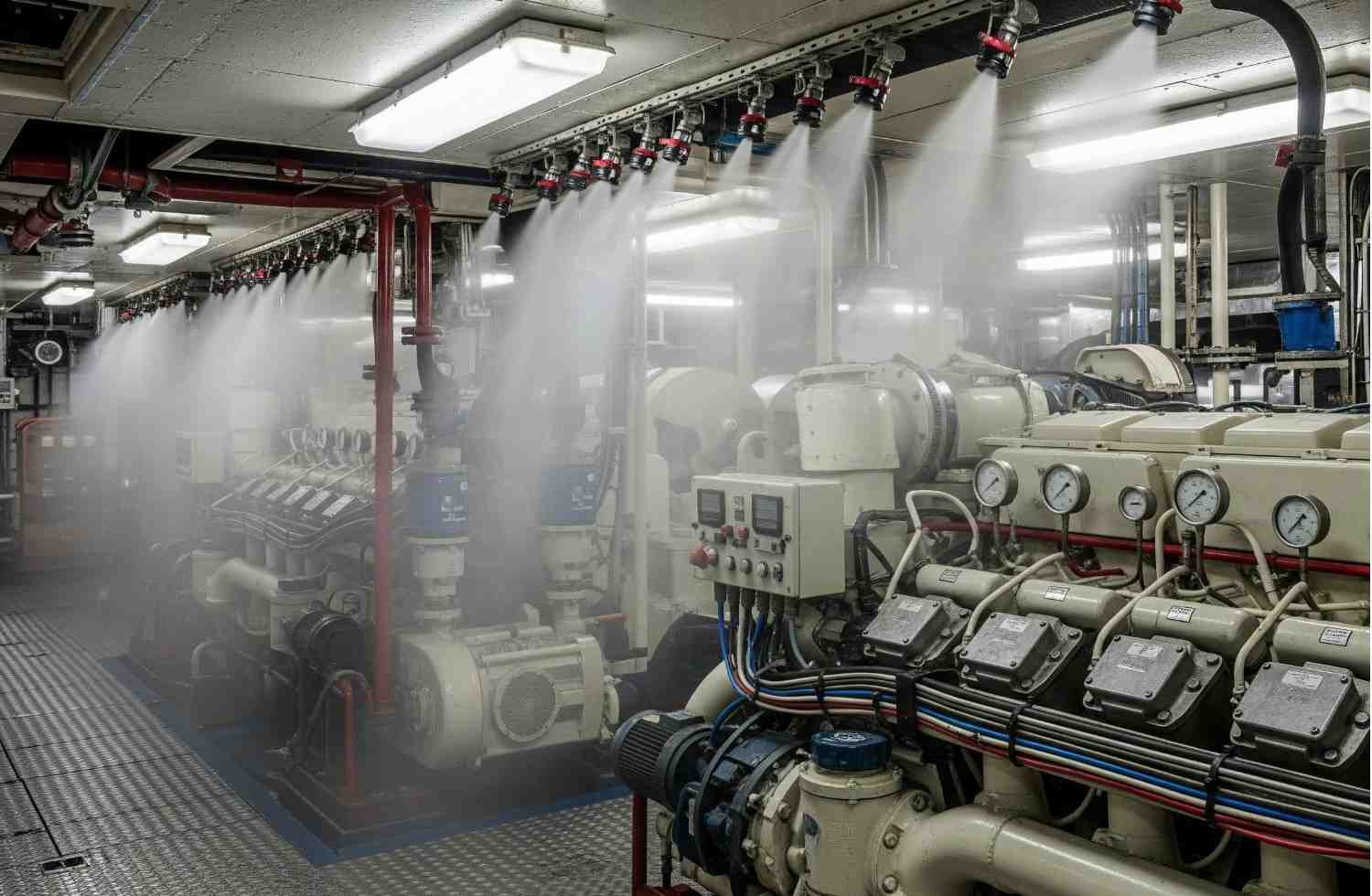
When it comes to safety on the water, fire is one of the most dangerous threats. Unlike on land, where help can arrive quickly, fires on boats or ships can spread rapidly and be harder to control due to limited space, fuel sources and environmental factors. This makes having the right marine fire suppression system a vital part of any vessel’s safety plan.
In this blog, we will explain the different types of marine fire suppression systems and how they work. You will learn about the main categories like water-based, foam, gas and chemical systems along with their uses, benefits and limitations. We will also discuss how these systems operate, why they are important for vessels in Dubai’s busy maritime industry and what factors to consider when choosing one for your boat or ship. Whether you operate a private yacht, fishing boat, cargo ship or commercial vessel, this guide will give you a clear understanding of your marine fire safety options.
Why Marine Fire Suppression is Critical
Marine fires can start for many reasons like engine overheating, electrical faults, fuel leaks or even cooking mishaps. Once started, they spread quickly due to confined spaces and combustible materials onboard. The dangers include:
- Rapid damage to the vessel
- Risk to passengers and crew
- Environmental hazards from fuel or chemical spills
- Expensive repairs and downtime
Having a reliable fire suppression system ensures that fires are detected early and extinguished effectively, reducing the risk of loss and injury.
Main Types of Marine Fire Suppression Systems
Marine fire suppression systems can be broadly divided into active and passive systems. Active systems detect and extinguish fires automatically or manually, while passive systems are structural measures like fire-resistant materials. Here, we focus on active suppression systems commonly used in marine environments.
1. Water-Based Systems
How They Work: Water-based systems use pumps and piping to deliver water to affected areas. These include sprinkler systems and water mist systems.
Types:
- Sprinkler Systems – release water when heat is detected.
- Water Mist Systems – produce fine droplets that cool flames and reduce oxygen levels.
Benefits:
- Effective for cooling and controlling flames
- Environmentally friendly
- Suitable for general areas, accommodation spaces, and decks
Limitations:
- Not suitable for electrical fires without special adaptations
- Adds weight to the vessel due to water storage
2. Foam-Based Systems
How They Work: Foam systems combine water with foam concentrate to create a blanket that smothers the fire and prevents oxygen from feeding it.
Types:
- Low-Expansion Foam – covers larger areas with minimal foam volume
- High-Expansion Foam – quickly fills enclosed spaces to suppress fires
Benefits:
- Excellent for fuel and oil fires (common in engine rooms)
- Prevents re-ignition by creating a barrier between fuel and air
Limitations:
- Requires proper drainage and cleanup after use
- Foam concentrate must be stored and maintained correctly
3. Gaseous Fire Suppression Systems
How They Work: These systems release gas (such as CO₂, FM-200, or Novec 1230) into the protected space. The gas displaces oxygen or interrupts the chemical reaction of the fire.
Common Gases Used:
- CO₂ Systems – reduce oxygen to stop combustion
- FM-200 – extinguishes without leaving residue and safe for electronics
- Novec 1230 – non-toxic, eco-friendly and effective in seconds
Benefits:
- Clean, no water or foam mess
- Ideal for engine rooms, electrical rooms and control panels
- Works quickly and efficiently in enclosed spaces
Limitations:
- Requires sealed spaces for best performance
- CO₂ can be hazardous to people in the area if not evacuated first
4. Dry Chemical Systems
How They Work: These systems use a powder-based extinguishing agent, which is discharged under pressure to smother flames and stop the fire’s chemical reaction.
Types of Powders:
- Monoammonium Phosphate (multi-purpose)
- Sodium Bicarbonate (best for flammable liquid fires)
Benefits:
- Very effective on flammable liquid and gas fires
- Works well for engine compartments and machinery spaces
Limitations:
- Leaves a powder residue that requires cleanup
- Not ideal for electronics due to potential corrosion
5. Hybrid Systems
How They Work: Hybrid systems combine water mist and inert gas to provide both cooling and oxygen reduction. This method is highly effective for multiple fire types.
Benefits:
- Reduces water damage compared to traditional sprinklers
- Safe for sensitive equipment
- Works quickly on both liquid and solid fuel fires
Limitations:
- More expensive and complex to install
- Requires specialized maintenance
How These Systems Operate
Marine fire suppression systems generally follow these operational steps:
- Detection – Sensors or detectors pick up heat, smoke or flames.
- Alarm – A warning alerts crew and passengers.
- Activation – The system releases the suppression agent automatically or manually.
- Extinguishing – The agent removes heat, reduces oxygen or interrupts the fire’s chemical process.
- Post-Fire Safety – The area is ventilated and systems are reset or refilled for readiness.
Choosing the Right Marine Fire Suppression System in Dubai
When selecting a system, consider:
- Type of Vessel – yachts, cargo ships and fishing boats have different needs.
- Fire Risk Areas – engine rooms, kitchens, fuel storage areas and passenger cabins may need different systems.
- Space & Weight Limitations – some systems require large storage tanks or cylinders.
- Environmental Regulations – Dubai follows strict marine safety and environmental laws.
- Maintenance Availability – choose systems with local service support for inspections and refills.
Maintenance and Inspection
No matter how advanced your marine fire suppression system is, it won’t work properly without regular maintenance. This includes:
- Checking pressure levels in cylinders
- Inspecting hoses, nozzles and control panels
- Testing alarms and sensors
- Refilling or replacing agents as required
- Conducting crew training for manual operation
In Dubai, maritime authorities often require certified inspections to ensure safety compliance.
Dubai’s Maritime Fire Safety Standards
Dubai’s ports, marinas and shipyards are some of the busiest in the region. To maintain safety:
- Commercial vessels must comply with international fire safety codes (like SOLAS).
- Private yachts are encouraged to follow the same high standards.
- Marine safety equipment providers in Dubai offer certified installation and servicing to meet these requirements.
Benefits of Installing the Right Fire Suppression System
- Life Safety: Protects passengers and crew from harm
- Asset Protection: Prevents costly vessel damage
- Regulatory Compliance: Meets Dubai’s marine safety laws
- Operational Continuity: Reduces downtime after an incident
- Peace of Mind: Knowing your vessel is equipped to handle emergencies
Conclusion
Fires at sea can be devastating, but with the right marine fire suppression system, the risks can be significantly reduced. From water-based and foam systems to gas, dry chemical and hybrid solutions, each type serves a unique purpose and environment. Understanding the types of marine fire suppression systems and how they work is the first step in choosing the right protection for your vessel.
At V-Tech Group, we specialize in supplying, installing and maintaining high-quality marine fire suppression systems that meet both international and Dubai maritime safety standards. Whether you operate a commercial ship, private yacht or offshore platform, our expert team ensures your vessel is equipped with the best fire safety solutions for complete protection on the water. Contact us today.



